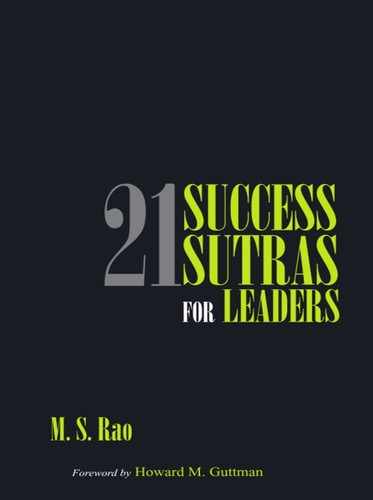Foreword
Books on leadership abound. They include tomes on servant leadership, situational leadership, laws of leadership, leadership as art, and leadership as science. In this cluttered, over-analysed space, it’s hard to imagine that another book could offer new, valuable insights. Yet 21 Success Sutras for Leaders does just that.
Beginning with the unexpected and very meaningful title of his book, Professor M. S. Rao offers a fresh perspective on leadership—one that combines the penchant for activity of the West with the propensity for self-examination of the East. For centuries, Hindus and Buddhists have looked to the Sutras for guidance in living their daily life. Professor Rao’s 21 Sutras will provide people in business and in every other walk of life with comparable wisdom as they strive to become leaders in the best sense of the word.
21 Success Sutras for Leaders is also distinguished from the many theoretical books on leadership by its focus on real-life examples. The wisdom that is embodied in each of Professor Rao’s Sutras has been extrapolated from, and is backed up by, the experience and observations of some of the world’s greatest leaders. In fact, the basic premise of the book is that in the area of leadership, as in all of life, we need to stop ‘learning by failing and failing’: The wise person learns not from his or her own mistakes, but from the mistakes of others. In this book, Professor Rao shines a spotlight on those mistakes and shares with us the lessons learned by those who made them.
While reading 21 Success Sutras for Leaders, I was amazed at the number and variety of leaders from whose experiences Professor Rao has drawn lessons: statesmen from Abraham Lincoln to Winston Churchill to Willy Brandt; major forces for social change such as Mahatma Gandhi and Martin Luther King, Jr.; and literary figures, including Aldous Huxley, Henry David Thoreau and Mark Twain. In the realm of business, Professor Rao taps into the thoughts of icons from Henry Ford to Charles Schwab and Jack Welch. His analysis of successful business leadership is strengthened by observations of gurus from Ken Blanchard to Stephen Covey to Marshall Goldsmith, Peter Senge, and—the greatest influence on my ideas about leadership— Peter Drucker.
Each of Professor Rao’s 21 Sutras will get you thinking about leadership concepts and ways in which you can apply them to your life, but three of them especially resonated with me. First, ‘Be a Coach, not a Critic’. I have been an executive coach for more than 20 years, and if there is one lesson I have learned, it is that there is no room for criticism in coaching. The relationship between coach and coachee must be based on mutual respect; the coach is not there to chastise, denigrate, or otherwise undermine the individual’s self-image and confidence. As Professor Rao points out, the key to a good coaching relationship is the way in which the coach delivers feedback: ‘… criticism is individual-centric … while feedback is behaviour-centric’. True leaders always focus on behaviour and deliver their feedback in a depersonalized, non-judgemental way.
The second Sutra that I find especially compelling, given my consulting experience, is ‘Don’t Compete, Collaborate’. Professor Rao chose to incorporate into his discussion of collaboration the words of Helen Keller, one of the most inspirational figures of recent times: ‘Alone we can do so little; together we can do so much’. This is the core of my belief that high-performing business teams are the key drivers of success. On such teams, members have put aside functional self-interest in favour of the good of the entire team and organization. Professor Rao provides valuable advice for leaders who would like to encourage collaboration among their team members.
And, perhaps more than any other, the Sutra that maintains that ‘Everybody is a Leader’ strikes me as a belief that all leaders must embrace. In today’s global, digitized and matrixed organizations, the old hub-and-spoke, hierarchical model, in which the leader commands and controls followers, just doesn’t work. Success depends on the existence of leaders throughout the organization, at all levels. Professor Rao reveals this truth when he asks and answers the question, ‘Who is a leader?’
Everybody is a leader, whether you are a CEO, a middle manager, a junior manager, a factory worker, a janitor, an entrepreneur, or a single parent. The one who leads from the front is a leader. The one who sets an example is a leader. The one who walks the talk is a leader. The one who takes responsibility is a leader. The one who influences others is a leader. The one who makes a difference to others is a leader. As long as people follow the rules of leadership, they are leaders.
I am sure that some of Professor Rao’s other Sutras will resonate more with you than these, my particular favourites. But no matter which ones you find most meaningful, I guarantee that all will give you food for thought—and ideas for actions you can take to become a true leader in your field.
Howard M. Guttman
Principal, Guttman Development Strategies, Inc.
